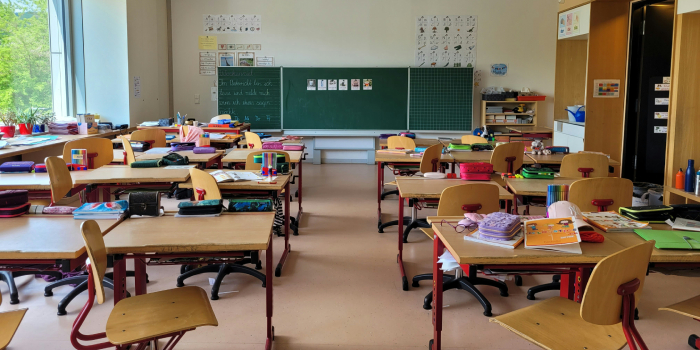Along with changes to the state budget and local financing, Indiana schools are getting ready for the implementation of over two dozen new education legislation on Tuesday, July 1. Unsplash photo by Nathan Cima.
The city of Indianapolis Although the start of the new school year is still a few weeks away, Indiana educators are already putting a number of new legislation that were approved during the 2025 legislative session into effect, such as adjustments to teacher compensation, attendance regulations, and classroom instruction.
The state’s next two-year budget and more than two dozen K–12 education laws are scheduled to go into effect on July 1.
Even though state spending was reduced overall, K–12 schools were spared more severe cuts, receiving a 2% rise over the next two years, or roughly $640 million in additional financing. Additionally, Indiana will eliminate the remaining income restrictions and transition to a universal, taxpayer-funded school choice voucher system in the second year of the budget.
However, the impact of fiscal deficits on public school funding is still unknown. For instance, Senate Enrolled Act 1 changed property tax laws to provide relief to two-thirds of homeowners in Indiana, possibly at the expense of school corporations and local governments. Additionally, the statute restricts school referenda to ballots for general elections only.
School budget uncertainty has also been increased by national changes in education policy, expired COVID-19 funding, and federal expenditure cuts.
In the interim, the Indiana Department of Education published its annual legislative guide last week to assist local leaders in navigating changes to state-specific policies.
The annual guidance is intended to act as a one-stop shop for schools and provide answers to frequently asked topics. In preparation for the 2025–2026 academic year, IDOE intends to improve it throughout the course of the summer.
In order to prevent retention, House Enrolled Act 1499 will allow students to retake the state-mandated IREAD exam at least twice during the summer, in keeping with the 2024 session’s strong emphasis on literacy in general.
Depending on the student body at the school, the new policy also exempts certain English language learners from reading retention.
Like the state’s literacy requirements, House Enrolled Act 1634 establishes a new statewide initiative to improve core math skills by mandating that schools conduct yearly math readiness screenings for kindergarten through second grade pupils starting in 2026–2027.
According to IDOE, the government anticipates releasing a comprehensive list of authorized math screeners by the spring of 2026, along with recommendations for the frequency and scheduling of assessments.
A multi-tiered system of interventions covering grades K–8 will be used to support students identified by the screener.
Additionally, the law mandates that qualified middle school students who receive a score above a D+ in mathematics and above proficient on ILEARN math be automatically enrolled in advanced math courses.
Stricter guidelines for teaching about human sexuality and STDs will also be implemented in Indiana schools beginning in the 2025–2026 academic year.
Senate Enrolled Act 442 explicitly states that school boards must formally approve all instructional materials pertaining to human sexuality used in grades four through twelve and publicly post a list of those materials on the district website, even though they already have the authority to review and approve curriculum materials.
Additionally, the new rule requires parents to be notified in writing at least 14 days prior to the start of classes.
On December 16, 2024, Secretary of Education Katie Jenner speaks to lawmakers at a meeting of the budget committee. Indiana Capital Chronicle photographer Whitney Downard took the picture.
Students who attend classes in person must watch a minimum of three minutes of medically correct and age-appropriate fetal ultrasound footage that documents the growth of a human fetus and a computer animation or depiction that documents conception through delivery.
According to state officials, the modifications are intended to improve parental involvement and transparency while preserving local authority over curricular specifics.
Legislators in Indiana passed Senate Enrolled Act 146, a hard-lobbying measure that increases the minimum teacher salary to $45,000 beginning in the 2025–2026 school year and increases the percentage of state tuition funding that districts are required to spend on teacher compensation from 62% to.
According to IDOE regulation, a school corporation must adopt a compliance plan and submit a justification form to the state if it does not meet the minimum wage or pay levels. The agency’s website will make those submissions available to the public.
New initiatives are underway to guarantee K–12 kids attend class after years of worry over the state’s escalating chronic absenteeism rate, which peaked during the epidemic and has been slow to recover.
By mandating that IDOE publish more precise statewide attendance definitions, guidelines for tracking student involvement, and a new list of best practices for local districts to implement, Senate Enrolled Act 482 adopts a more assertive approach to student attendance.
The law now clearly defines chronic absenteeism as missing at least 10% of the school year’s instructional days for any cause, even if it is excused.
IDOE advises monitoring student attendance on a monthly basis, with five cumulative absences—whether excused or unexcused—serving as intervention triggers. Attendance contracts, staff mentoring, family outreach, and recommendations for resolving obstacles like health care or transportation are some of the suggested assistance.
Before any legal action is taken, the new law permits local prosecuting attorneys to meet with parents for intervention purposes in an effort to improve a student’s attendance.
Additionally, K–8 pupils cannot be punished for routinely skipping class or being chronically absent until July 1, 2026. However, if pupils skip too many days of class after that date, they may be expelled from school once more.







